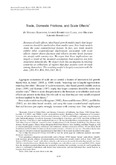Trade, Domestic Frictions, and Scale Effects
Abstract
Because of scale effects, idea-based growth models imply that larger countries should be much richer than smaller ones. New trade models share the same counterfactual feature. In fact, new trade models exhibit other counterfactual implications associated with scale effects: import shares decrease and relative income levels increase too steeply with country size. We argue that these implications are largely a result of the standard assumption that countries are fully integrated domestically. We depart from this assumption by treating countries as collections of regions that face positive costs to trade among themselves. The resulting model is largely consistent with the data.
Keywords
URI (Permanet link to cite or share this item)
http://dx.doi.org/10.1257/aer.20141449https://repositorio.catie.ac.cr/handle/11554/9537
Collections
- Publicaciones y documentos [4421]


